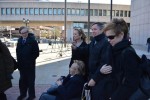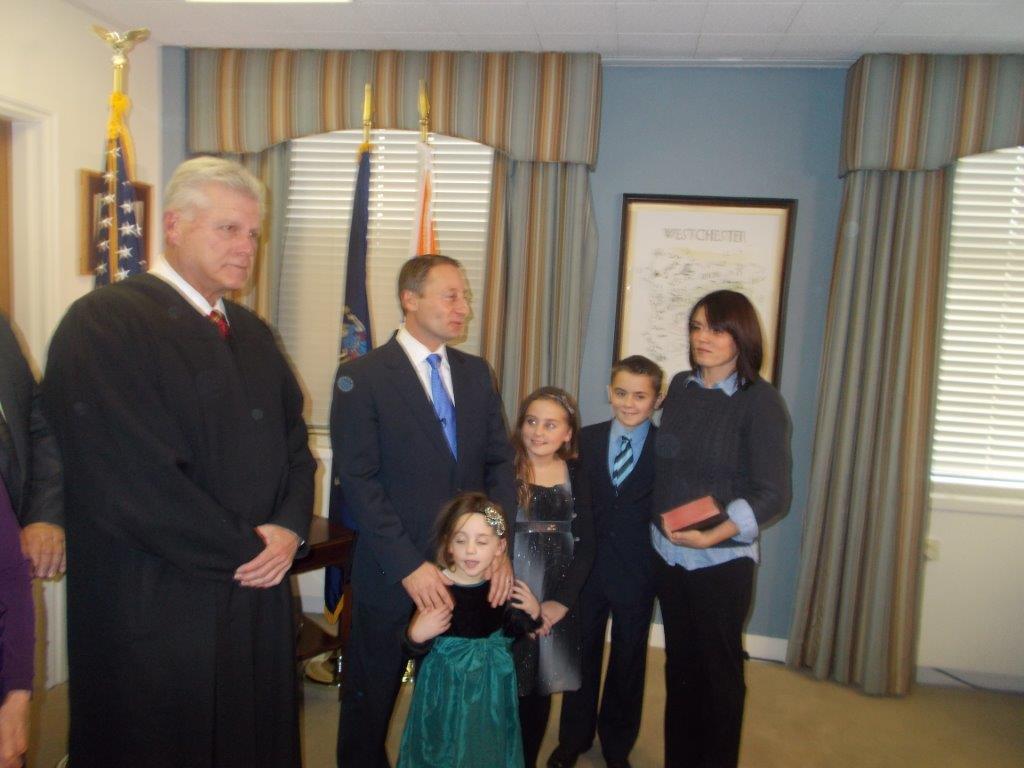Kerry Kennedy Lawyer Calls Sleeping Pill ‘a Mistake’ in Opening Day of Trial

The drugged driving trial of Kerry Kennedy began in Westchester County Court in White Plains Monday with the prosecution and defense agreeing that she had been driving in North Castle under the influence of a sleeping pill.
However, while the prosecution argued that the daughter of the late Sen. Robert F. Kennedy wrongly continued driving after she had taken a dose of Ambien, the defense contended that she took the pill accidentally.
Kennedy, 54, was arrested on July 13, 2012, in Armonk after she was involved in an accident with a tractor-trailer on I-684. She did not stop after the accident and continued to drive her damaged car until getting off at Exit 3 in Armonk.
“This case is about a mistake, plain and simple,” defense attorney Gerald Lefcourt said in his opening statement at the trial, which featured appearances by Kennedy’s mother, Ethel, and brothers Robert F. Kennedy, Jr. and Douglas Kennedy.
But Assistant District Attorney Stefanie DeNise painted a different scenario for the four-man, two-woman jury. After Kennedy exited the interstate, North Castle police arrived at Route 22 and Hunter Avenue where her Lexus SUV stopped. Police stated that Kennedy appeared to be disoriented, DeNise said.
She added that Kennedy had no medical condition that would have accounted for her state.
In his opening remarks, Lefcourt countered that Kennedy takes Ambien to help her sleep during humanitarian trips abroad for the Robert F. Kennedy Center for Human Rights, which she established more than 25 years ago. He also said that she takes medication every morning for a thyroid condition.
On the morning of the accident, Kennedy was dressed for a workout at The Gym in Armonk and was scheduled to drive to a meeting in New York City later that day, Lefcourt said. The defendant was wearing gym clothes and packed another outfit for her meeting, signaling that there was no intent to take a sleeping pill, he said.
Lefcourt said Ambien has a powerful effect on women. Six months after the incident, the FDA instructed women to cut their dosages to about half of what men take.
The prosecution called four witnesses during the first day of testimony. Prosecution witness Henry Meyers, who lived in Mount Kisco in July 2012, recalled that about 7:40 a.m. on the morning of the accident he was driving behind what turned out to be Kennedy’s Lexus SUV. On the entrance ramp to I-684 “she swerved to the grass,” he said.
Meyers estimated that once on the highway she was driving between 70 and 75 miles per hour and Kennedy’s vehicle hit a tractor-trailer. Neither Kennedy nor the truck driver stopped after the accident. The Lexus sustained damage, including a shredded front passenger side tire. Meyers said he called North Castle police to report the incident.
Another prosecution witness, Armonk resident William Carlino, said Kennedy’s car stopped in the left-turn-only lane of Route 22 to Hunter Avenue. He stopped to help and speak to Kennedy, and found her slumped over the steering wheel of her vehicle. He then called North Castle police.
North Castle Police Officer Joel Thomas testified that he drove to Route 22 after the department learned of the I-684 accident. Nearly an entire one-hour video taken by Thomas’ police car was shown to the jury. Thomas recalled Kennedy’s speech was “slow and deliberate.” She failed three of four sobriety field tests he conducted at the scene, passing only a test reciting letters of the alphabet.
The officer said it appeared she had taken “some type of drug.”
Under cross examination from defense attorney William Aronwald, Thomas said he did not have any formal medical training outside of what he received at the police academy.
State Trooper Bradley Malloy, a certified drug recognition expert, told the court that he took Kennedy in handcuffs to the police barracks in Somers. Kennedy voluntarily agreed to give him blood samples and was later charged with driving while ability impaired, a misdemeanor.
Malloy’s testimony was scheduled to continue when the trial resumes on Tuesday at 9:30 a.m. Judge Robert Neary said he hopes the case will be finished by the end of the week.


